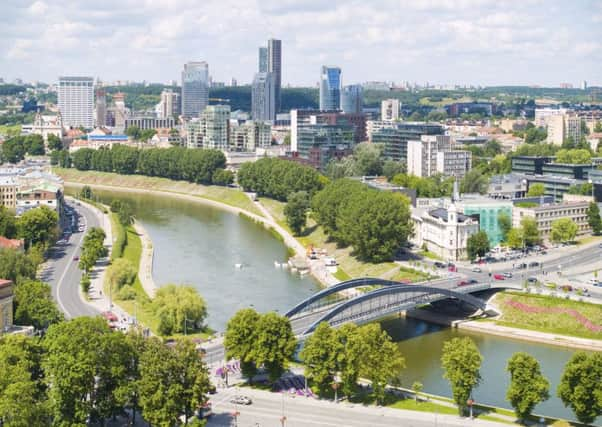Exporting PPP is name of the game


When you think of links between Scotland and Lithuania, what comes to mind? It might a weekend break to the beautiful capital city of Vilnius, a Unesco World Heritage Site. Or it might be the recent tumultuous links between that country and one of our biggest football clubs. What would definitely not be your first thought is Public Private Partnerships, or PPP to its friends.
The model formerly known as PFI (private finance initiative) has changed beyond recognition over recent years. Now, with years of pioneering experience behind us, PPP is fast becoming an opportunity to export some of Scotland’s professional expertise to what is a growing market in the Baltics and beyond.
Advertisement
Hide AdAdvertisement
Hide AdAt the start of next month I’m answering an invite to Vilnius to speak at two key infrastructure conferences. This didn’t come out of the blue – last year my firm was among those who welcomed a delegation from the Lithuanian government on a fact-finding mission to Scotland, while I’ve previously spoken in the country on one of several business visits.
The first event “Public and private sectors partnership: Lithuanian experience and future prospects” is organised by the finance ministry, Central Project Management Agency and PPP Lietuva and has attracted a number of significant international, as well as Lithuanian speakers. The second event is intended to introduce public sector project sponsors in Lithuania to administrators with responsibility for allocation of European Union Structural Funds – an event at which I will be the only international speaker.
Why are Lithuanians so interested to hear from a lawyer about what’s going on in a part of Europe more peripheral than their own, and not so much bigger? At the “hub” (pardon the pun) of their interest is the Scottish hub programme – five geographical territories in which public bodies have teamed up with a private partner to form a joint venture company that develops and delivers a diverse pipeline of community infrastructure projects.
As leading Scottish infrastructure and projects advisers we have specialised insight to offer. The hub programme has attracted significant interest in Lithuania and other Eastern European countries due to its proven track record in reducing project costs, delivering faster and more cost effective procurement, providing more flexible procurement solutions and improving user experiences.
The “ultimate” PPP nature of hub, where public sector bodies are investors in hubco, participate in the management of the company and also have an opportunity to invest in their own projects alongside private sector partners is particularly enticing.
Scotland’s strong track record in hub, Non Profit Distributing (NPD) and other project financed schemes is held in very high regard in other countries. Being able to advise connections that a fellow small country like Scotland has achieved financial close on more than 100 projects is really impressive.
Even our own firm’s track record in hub deals, with 13 completed projects with a combined value of over £275 million, as well as nine current projects, gets people’s attention.
We have also been able to point to how Scotland has led the way in developing “affordable” PPP, through ensuring that investor returns are fixed, reviewing the scope of services procured and adopting “sensible” positions on key project risks.
Advertisement
Hide AdAdvertisement
Hide AdOverall, it is fantastic to be able to discuss Scottish experience and expertise in these areas and to encourage those in other countries who are actively developing their infrastructure to adopt our practices and structures.
Bringing it all back home
We may be exporting our knowledge, but PPP is still a developing area in Scotland. Our Infrastructure & Projects team plays a key role in educating stakeholders in Scotland on the nuances of hub and NPD. We’re currently running a number of Masterclass Seminars dealing with practical topics drawn directly from our experience in working on deals in Scotland.
At the heart of all this engagement, at home and abroad, is a desire to break down barriers that can exist between different advisers appointed by clients in relation to major infrastructure projects.
Whether you’re in Lithuania or Lerwick, the project agreement that underpins each project is a legal led document, but contains many elements that have to be drafted, negotiated and agreed by other advisers (in particular the finance and technical advisers). We have developed extensive guidance and methodologies to assist those other advisers and the client in navigating through this process and ensure you arrive at an overall document that fits properly together – significantly reducing the risk of costly disputes arising in the future.
• Euan Pirie is head of the Infrastructure & Projects team at Harper Macleod www.harpermacleod.co.uk